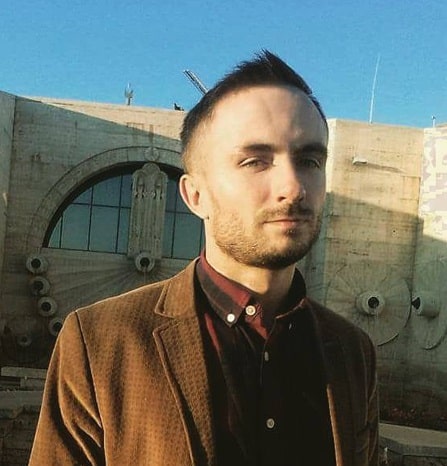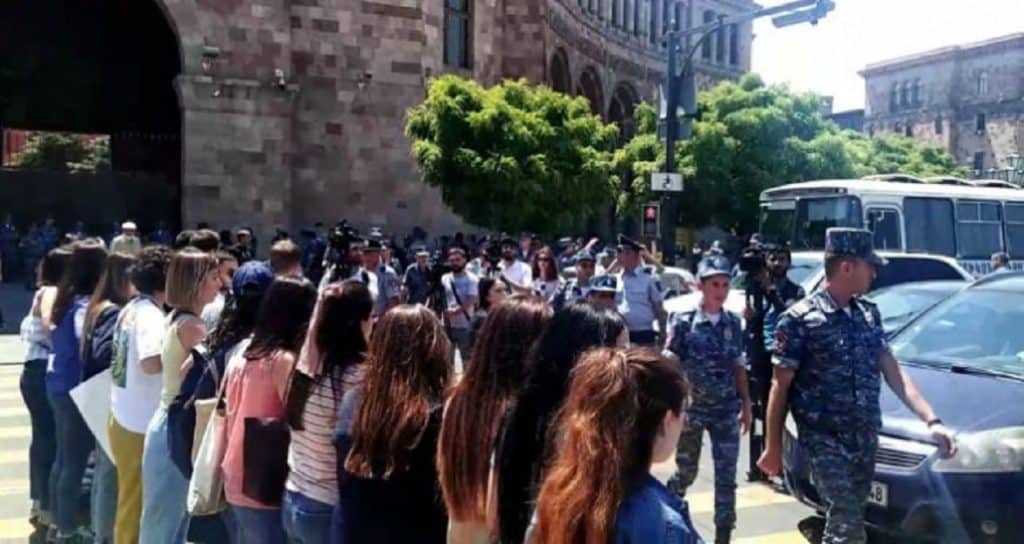By Anton Evstratov
Armenia’s opposition political parties, with relatively low ratings, used all possible means to increase their popularity ahead of the 20 June elections.

A recent rally by members of the youth wing of the Dashnaktsutyun party in central Yerevan was dispersed by police. The participants were partially detained and partially forced to leave the venue under pressure from law enforcement officials. Despite the relatively small number of rally participants and its clearly marginal nature, Dashnaktsutyun took care to give maximum publicity to the situation.
The situation was in some sense exacerbated by the fact that the incumbent prime minister himself and his supporters came to power during the street protests of spring 2018. Any opposition to public civic activism by the government is therefore perceived by its opponents as a “stranglehold on freedom”.
At the same time, the Dashnak rally was clearly provocative, and the formal reason for its termination by the police was that rally participants were littering in the street and refused to clean up after themselves.
It should also be noted that the ARF Dashnaktsutyun is now one of the main forces opposing Armenian Prime Minister Nikol Pashinyan and his “My Step” bloc. The Dashnaks are part of the bloc “Armenia” led by the ex-president and aim to change the power in the republic during the June 20 elections.
However, Dashnaktsutyun and its leader Ishkhan Saghatelyan have, to put it mildly, low ratings compared to the popular Kocharyan, gaining no more than several per cent of potential voters. The party has gained significant antipathy within Armenian society by being linked to the deposed Serzh Sargsyan’s “velvet revolution”, his “Republican Party” and a number of corruption scandals. In this sense, the Dashnaks’ attempts to be active in the streets appear to be part of a desire to regain at least some of their earlier popularity.
However, this particular attempt was unsuccessful in general – the Armenian society was rather unconcerned about the power confrontation in the street. On the one hand, it was due to the lack of mass action and, on the other hand, to the fatigue of many Armenians towards Dashnaktsutyun. That said, the party retains its contradictory and unusual character – while unpopular in Armenia, it is the first and most influential force in the Armenian diaspora abroad, particularly in the West and the Middle East. This, despite failures in domestic Armenian politics, allows the Dashnaks to continue to operate with significant financial resources, attract cadres from foreign Armenians and have considerable room for any political manoeuvres.
However, even despite all this, there is clearly a “weak link” in Kocharian’s Dashnaktsutyun bloc. It was displayed against the background of the difference in attendance of meetings of this party proper and the general actions in support of Robert Kocharyan, which used to bring together up to several dozens of thousands of participants. It is obvious that the ex-president of the Republic of Armenia is counting on the Dashnaks not as an internal Armenian force, but as a party capable of attracting foreign financial resources.
Kocharyan’s common desire to distance himself from the unpopular Serzh Sargsyan, whom he himself once made president of Armenia in 2008, should be noted. One ex-president is now actively criticizing the other and trying not to work with forces loyal to him.
Sargsyan himself is aware of the negative attitude of the Armenian society. That’s why he made the former head of the National Security Service, Artur Vanetsyan, the number one candidate in his Honour Block, a highly controversial politician who stands a better chance of being elected than the former president.
Overall, the unpopularity of opposition leaders, their inconsistent and even antagonistic positions, play into the hands of Nikol Pashinyan and his supporters. Largely due to the weakness of the opposition, My Step still not only remains in politics, but has a good chance of winning the June 20 election. It is unlikely to be an outright success and form a one-party government, but Pashinyan’s supporters are perfectly capable of becoming the first force in parliament. The bloc’s further parliamentary struggle as such will be seriously assisted by the opposition’s disunity, which will find it extremely difficult to agree even to form a common coalition opposing My Step Alliance.
Author: Anton Evstratov (Russian historian, publicist and journalist living in Armenia, lecturer at the Department of World History and Foreign Regional Studies at the Russian-Armenian University in Yerevan).
(The views expressed in this article belong only to the author and do not necessarily reflect the editorial policy or views of World Geostrategic Insights).







